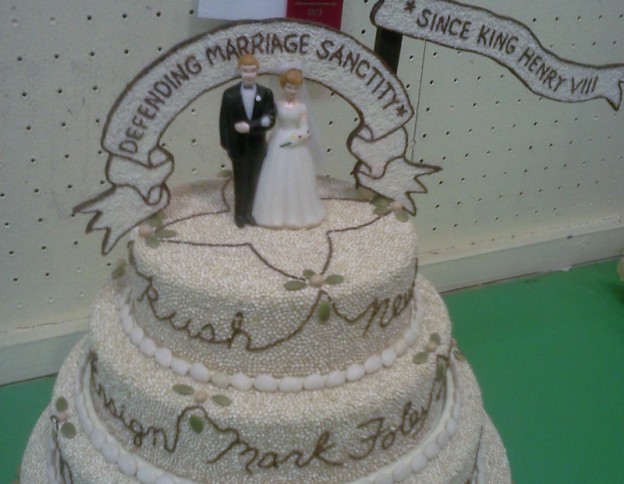

Voting No: Elevating the Sanctity of Marriage
When I decided to get married ten years ago, it was not without trepidation. It was not our affection or commitment I doubted; rather, it was the world in which our marriage would exist.
As a feminist, I knew that truly traditional marriage was a financial contract between a father and a husband. The daughter/wife was there simply to ensure the transfer of property from her father to husband to the son she would bear. That’s why a father gives away his daughter in traditional wedding ceremonies: it’s a transfer of property from one owner to another. Truly traditional “unions between one man and one woman” were about as romantic as signing your mortgage papers.
In modern times, these medieval practices were channeled into more socially acceptable forms, but they haunt marriage still. For example, exemptions for sexual assault committed by a spouse (a.k.a. ‘marital rape’) existed in U.S. until 1993. Even though those laws are off the books, “marital rape” is often treated more lightly by the legal system [1]. This attitude toward sex in marriage is a direct result of viewing a wife as property: she is a “a bonded slave” to use Voltairine de Cleyre’s famous indictment of marriage as legal prostitution. In other words, I knew that traditional marriage was less about love and more about power, even in the twenty-first century.
My other doubt centered on the idea that my marriage would be an act of discrimination. How could I marry knowing my lesbian and gay friends would not be able to do the same? Marriage does impart legal, financial, and social privileges. It would be easier to get a mortgage. My taxes would be lower. If my spouse landed in the hospital, I would be able to see him and make decisions for him. My friends in same-sex relationships were cut out of these everyday benefits. It felt like when I said, “I do,” I’d really be saying, “I get to do this and you don’t.” I wanted to make a life-long commitment to my partner, not to heterosexual privilege.
But I decided to do it after all. I decided to do it because I wanted to make a public commitment in the presence of those I loved. I decided to do it because I had found my fellow traveler. I decided to do it because I had hope that by living our relationship differently, we could change this institution from one of oppression and exclusion to one of “love freely given”.
That hope is in danger of being extinguished. In a little over a month, the people of Minnesota will be asked to vote on an amendment that will make each legal marriage in the state an act of everlasting discrimination. Every “I do” will turn into a perpetual “I get to do this and you don’t.” In addition, this amendment will cheapen marriage. To vote yes on this amendment means that we say yes to the traditions of inequality, materialism, and domination on which marriage was based for centuries. Women and men have long recognized that some traditions must end so that others can thrive: mutual love and respect. On Election Day, elevate the sanctity of marriage by voting no on marriage discrimination. Consider it an act of faith.
[1] Munjal, Diksha. “Intimate Partner Violence-is there A Solution?” Duke Journal of Gender Law & Policy 2012: 347-72. GenderWatch. Web. 22 Sep. 2012 .
Thanks for your feedback. If we like what you have to say, it may appear in a future post of reader reactions.

